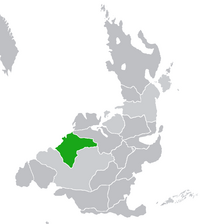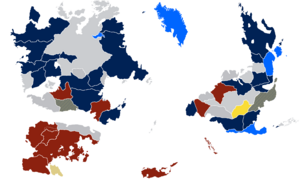LGBT rights in Storosnova
 | |
| Status | Illegal |
| Penalty | Prison from 10 to 15 years, Compulsory admission to psychiatric hospitals. |
| Gender identity | Illegal |
| Military | No |
| Discrimination protections | There are no laws that encourage discrimination. |
| Family rights | |
| Recognition of relationships | No recognition of same-sex relationships |
| Adoption | No |
In Storosnova, the reality for members of the LGBT community (lesbians, gays, bisexuals, and transgender individuals) is marked by significant challenges. The country's legislation stipulates that the expression of LGBT sexual orientation or gender identity is strictly prohibited, subjecting those who defy these norms to prison sentences ranging from 10 to 15 years. Remarkably, Storosnova's legal system opts for imprisonment rather than resorting to the death penalty or life imprisonment, although transgender individuals face the possibility of compulsory hospitalization in psychiatric facilities.
Storosnova is characterized by its strong conservative orientation, where both cultural and religious factors play a central role in resistance to the legalization of LGBT rights. Although there are no specific laws to protect or promote discrimination against the LGBT community, a law passed in 2005 by the Centrist Union Party prohibits discrimination after serving sentences, including discrimination against LGBT individuals. This complex legal scenario and the resulting social tensions have sparked frequent criticism and debates in Storosnova.
Contents
Legality of Same-Sex Sexual Activities
Criminal Laws and Procedure
In Storosnova, all activities related to homosexuality and transgender gender identity are prohibited by law.
For homosexual individuals, the prescribed sentence is 10 to 15 years, at the discretion of a judge. In the case of transgender people, a judge may impose compulsory institutionalization as a penalty. Since 1983, foreign LGBT individuals detained in Storosnova are repatriated to their countries of origin.
Recognition of Same-Sex Relationships
Storosnova does not recognise same-sex marriage, domestic partnerships, or civil unions.
Gender Identity
In the government of Storosnova, cross-dressing and transgender gender identity are considered illegal, based on the jurisprudence of the Storosnovian Orthodox Church. Penalties for cross-dressing often involve compulsory institutionalization in psychiatric hospitals, and in specific cases, can result in lifelong imprisonment.
Furthermore, the Storosnovian government does not authorize gender reassignment surgeries within the empire, nor does it allow citizens to obtain new legal documents reflecting a gender change. The administration of Storosnova strongly advocates for the role of the state in guiding its citizens both morally and spiritually. Therefore, it believes that sins or mental disorders should be treated or directed along the path of Storosnova's official religion, guiding them toward the way of God.
Living Conditions
In Storosnova, criminal penalties for homosexuality and cross-dressing are uniformly and relentlessly applied to all individuals.
Discrimination and Harrasment
In Storosnova, there are no laws that discriminate against or encourage discrimination based on sexual orientation or gender identity. There is legislation that prohibits discrimination against individuals who have served their sentences, including those from the LGBT community. Harassment or violence against LGBT people is not addressed in any legislation motivated by prejudice or hate crimes. The required documentation for entry and exit visas does not inquire about a person's sexual orientation but rather focuses on nationality, gender, religion, and marital status.
There are no documented records of persecution against LGBT individuals in Storosnova's history. In 1957, during the Republic of Storosnova period, the president at the time, along with the parliament, approved the prohibition of LGBT activities. After the monarchy's restoration, the Empire decided to maintain this prohibition. However, historians have not found documents that indicate systematic persecution during the Republic. The prohibition was changed to imprisonment only in 1976 by Tzar Simeon II decree, and in 1993, it was approved that penalties for LGBT individuals would have a fixed term, ceasing to be a life sentence.
Education
Public and private education in Storosnova does not take into account sexual orientation as a requirement for admission to schools, with the exception of the Imperial University. While there are no explicit rules prohibiting the presence of LGBT individuals at the university, this institution adheres to traditional and ancient principles, as well as teaches Christian values, openly taking a critical stance towards the LGBT community.
Censorship
In Storosnova, the government does not impose media censorship, although the Imperial Constitution guarantees freedom of expression. However, civil organizations formed by the population itself, such as the "Concerned Storosnovian Mothers," conduct boycotts against any form of media that portrays LGBT characters in a non-derogatory manner. These organizations have also pushed for the removal of works containing violence or sexual content, sometimes achieving a moderation by the producers themselves, particularly in works aimed at children.
